Remington Premier Bismuth Waterfowl 12 Gauge 2.75" #2 1.25 oz – 25rds – R20503 For Sale
$51.09
The Remington Premier Bismuth Waterfowl 12 Gauge 2.75″ #2 1.25 oz – 25rds (Model: R20503) is part of Remington’s Premier Bismuth line, offering hunters enhanced impact and extended range capabilities for various game. Utilizing HEVI BISMUTH, known for its superior density over traditional steel, this ammunition allows for longer-range shots with increased lethality. The dense composition enables the use of smaller shot sizes, resulting in more pellets per shot for precise targeting and higher success during hunts. Ideal for both upland game and waterfowl, the Premier Bismuth combines versatility and affordability, offering hunters high performance without high costs.
Can you shoot bismuth at waterfowl?
Yes, bismuth can be used as a non-toxic alternative to lead in shotgun pellets for hunting waterfowl. It is an environmentally friendly choice that complies with regulations prohibiting the use of lead shot for waterfowl hunting in many areas.
Why are bismuth cartridges so expensive?
Bismuth cartridges are more expensive than traditional lead cartridges due to several factors:
1. **Material Cost**: Bismuth is rarer and more costly to procure and process than lead, driving up the material cost for manufacturers.
2. **Manufacturing Process**: Bismuth cartridges often require specialized manufacturing techniques to ensure proper ballistic performance and to handle its more brittle nature compared to lead.
3. **Non-Toxic Alternative**: Bismuth is often used in hunting and shooting situations where non-toxic shot is required, such as wetland areas, due to its environmental safety advantages over lead. This specialized use can contribute to higher prices.
4. **Market Demand**: As a niche product for specific applications, the demand might not reach the levels seen for more common ammunition, leading to less economy of scale and thus higher prices.
5. **Import and Export Considerations**: If bismuth components need to be sourced internationally, fluctuating exchange rates and tariffs can also impact the final cost.
These factors combined contribute to the relatively high price of bismuth cartridges compared to those made from other materials.
Is bismuth better than lead?
The question of whether bismuth is “better” than lead depends on the context in which you are comparing the two elements, as they have different properties and uses.
1. **Toxicity**: Bismuth is non-toxic and considered safe for use in various applications, including cosmetics, pharmaceuticals, and certain food products. Lead, on the other hand, is toxic and poses health risks, such as lead poisoning, particularly in children.
2. **Density**: Lead is much denser than bismuth and has been traditionally used for applications requiring heavy weights, such as in radiation shielding, lead-acid batteries, and weights. However, due to toxicity concerns, bismuth is sometimes used as a safer alternative in situations where high density is not as critical.
3. **Melting Point**: Bismuth has a relatively low melting point, which makes it useful in certain low-temperature alloy applications. Lead similarly has a low melting point but carries the disadvantage of toxicity.
4. **Applications**: In hunting and fishing, bismuth is often considered better than lead because it offers similar performance as a dense metal while being non-toxic, reducing environmental and health impacts.
5. **Cost and Availability**: Lead is more abundant and generally less expensive than bismuth. However, regulations against lead due to toxicity can make using bismuth more advantageous, despite its higher cost.
Overall, “better” depends on what you prioritize: environmental and health safety, cost, density, or another factor specific to your application. For use cases where toxicity is a significant concern, bismuth is likely the better choice.
Is TSS better than bismuth?
To provide a clear answer, we need more context about what “TSS” and “bismuth” refer to and the criteria for comparing them.
– **TSS**: This could refer to various things, such as Total Suspended Solids in water treatment, Terminal Slide Slip in geosciences, or even different brand names or technology specific codes.
– **Bismuth**: This is a chemical element, often used in medical and cosmetic applications, or known for its low toxicity in comparison to lead.
If you’re comparing two specific technologies, products, or substances represented by these terms, the context (such as the application or industry) greatly influences the answer.
Please provide more details, such as which industry or application you are referring to and the criteria for comparison, so I can give a more tailored response.
Can I shoot bismuth through a full choke?
Yes, you can shoot bismuth through a full choke. Bismuth is softer and less dense than steel, making it more suitable for use with tighter chokes like a full choke. It behaves more like lead, which is traditionally used with full chokes. However, it’s always important to check the manufacturer’s recommendations and ensure that your shotgun is rated to handle the type of ammunition you are using.
What is the only legal gun that can be used to take waterfowl?
The only legal gun that can be used to take waterfowl in the United States is a shotgun. The shotgun must be a 10-gauge or smaller and capable of holding no more than three shells unless it has been plugged with a one-piece filler, which cannot be removed without disassembling the gun.
Can you shoot bismuth in old shotguns?
Bismuth is generally considered safe to use in older shotguns as an alternative to lead shot. It is softer than steel, reducing the risk of damage to the barrels of older guns. However, it is important to ensure that the bismuth shot shells are properly sized and that the shotgun is in good condition. When in doubt, consult with a gunsmith or refer to the manufacturer’s guidelines for your specific shotgun model to ensure safety and compatibility.
How much does a pound of bismuth cost?
As of the most recent data, the cost of bismuth per pound is approximately $5 to $15. However, prices can fluctuate due to factors like market demand, purity, and supplier. For the most accurate and current pricing, it’s recommended to check with specific suppliers or marketplaces.
What size bismuth shot for geese?
For hunting geese with bismuth shot, sizes BB, BBB, and T are commonly recommended. These sizes provide the necessary power and penetration for effectively hunting larger waterfowl like geese. Always check local regulations and ensure that the ammunition is suitable for your specific hunting conditions and firearm.
Can you mix lead and bismuth?
Yes, you can mix lead and bismuth. These metals can form an alloy, which is often utilized to reduce the melting point of lead. This is particularly useful in various applications such as soldering, where a lower melting point can be advantageous. However, when handling lead or lead-based alloys, it’s important to consider safety precautions due to lead’s toxicity.
What size shot of bismuth to lead?
A shot size of bismuth to lead typically refers to the equivalent size of bismuth shot that would match the performance of a particular size of lead shot. Bismuth is denser than steel but less dense than lead. Generally, you would use the same shot size for bismuth as you would for lead, but due to differences in density, you might notice a slight variation in performance. If you want to closely replicate lead shot performance using bismuth, you can often stick with the same size. Always be sure to check regulations and guidelines, as well as consult product specifications for optimal results.
What is a cheap alternative to lead shot?
A cheap alternative to lead shot is steel shot. It is commonly used in hunting and shooting sports as a non-toxic option. Steel is more affordable than other alternatives such as bismuth or tungsten, making it a popular choice for those seeking a budget-friendly and environmentally safer option.
Can you shoot bismuth through Carlson choke tubes?
Yes, you can shoot bismuth through Carlson choke tubes. Bismuth is a softer metal compared to steel, making it less likely to damage choke tubes. Carlson choke tubes are designed to handle a variety of non-toxic shot types, including bismuth, which makes them suitable for use with bismuth ammunition. Always refer to your specific choke tube and firearm manufacturer’s guidelines to ensure compatibility.
Is bismuth shot safe in old shotguns?
Bismuth shot is often considered safe for use in old shotguns because it is less dense and softer than lead shot, which makes it less likely to damage the barrels of older firearms. Unlike steel shot, which can be too hard and potentially cause barrel damage in guns not designed for it, bismuth shot is a better alternative for vintage shotguns that were originally made for lead loads. However, it’s important to ensure the shotgun is in good working condition and to consult the manufacturer’s recommendations or a gunsmith to verify compatibility with bismuth shot.
What type of shot is illegal when hunting waterfowl in the US?
The use of lead shot is illegal when hunting waterfowl in the United States. Only non-toxic shot, such as steel, bismuth, or tungsten-based options, are allowed for waterfowl hunting to prevent environmental contamination and protect wildlife.
Be the first to review “Remington Premier Bismuth Waterfowl 12 Gauge 2.75" #2 1.25 oz – 25rds – R20503” Cancel reply
Related products
Remington Premier Bismuth Waterfowl
Remington Premier Bismuth Waterfowl .410 Gauge 3" #4 0.56 oz – 25rds – R20514
Remington Premier Bismuth Waterfowl
Remington Premier Bismuth Waterfowl 12 Gauge 3" #2 1.37 oz – 25rds – R20500
Remington Premier Bismuth Waterfowl
Remington Premier Bismuth Waterfowl 12 Gauge 3" #5 1.37 oz – 25rds – R20501
Remington Premier Bismuth Waterfowl
Remington Premier Bismuth Waterfowl 28 Gauge 2.75" #4 0.87 oz – 25rds – R20513
Remington Premier Bismuth Waterfowl
Remington Premier Bismuth Waterfowl 16 Gauge 2.75" #4 1.12 oz – 25rds – R20511
Remington Premier Bismuth Waterfowl
Remington Premier Bismuth Waterfowl 20 Gauge 2.75" #5 0.87 oz – 25rds – R20509
Remington Premier Bismuth Waterfowl
Remington Premier Bismuth Waterfowl 12 Gauge 2.75" #5 1.25 oz – 25rds – R20505
Remington Premier Bismuth Waterfowl
Remington Premier Bismuth Waterfowl 20 Gauge 3" #5 1.25 oz – 25rds – R20508
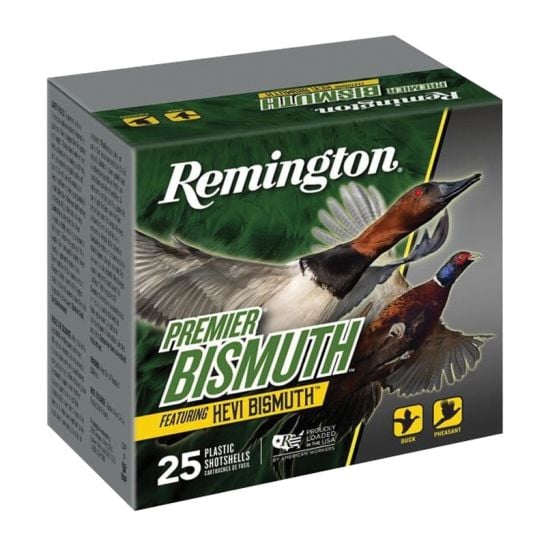
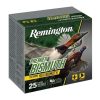
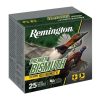
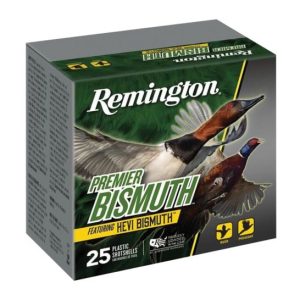
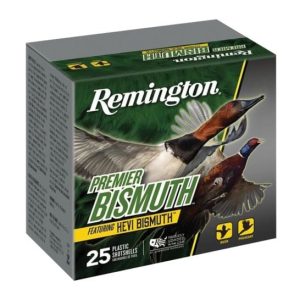
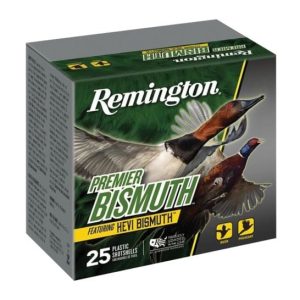
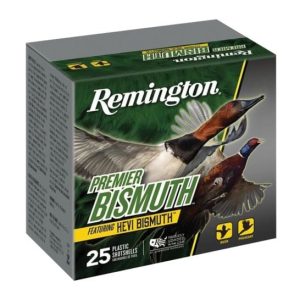
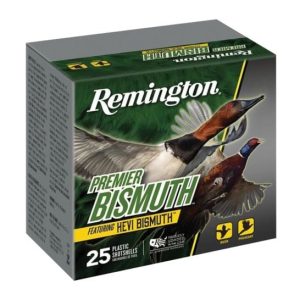
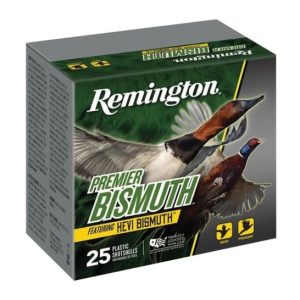
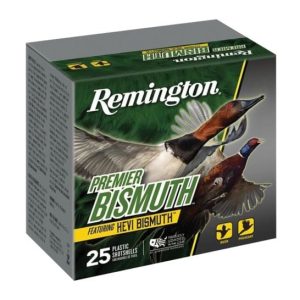
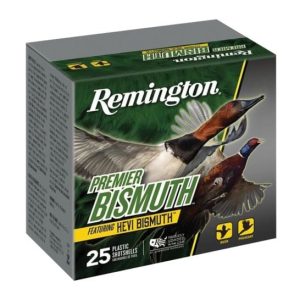
Reviews
There are no reviews yet.